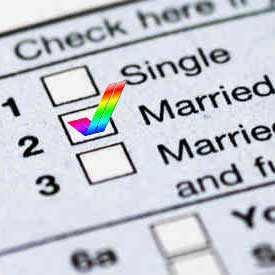On June 26, 2015, U.S. Supreme Court ruled that same-sex marriage is legal in the eyes of the federal government. That was a monumental day for the LGBTQIA+ community. At long last, we have the right to marry and be happy with our lovers.
In a recent interview with Dan “The Tax Man” Boles of Alta Business and Tax Services in Las Vegas, was asked a few questions about these new laws.
Q. What challenges do you foresee this upcoming tax season?
A. Misinformation. Now that we have Same-Sex Marriages, everyone is under the assumption that there are different laws for them.
With that come to the same rights to pay taxes. Paying taxes is something that most people forget that they are now a couple and have to give money to Uncle Sam. That also means that your tax brackets have changed. When it comes to filing your taxes it might be a good idea to talk to a tax professional that can help you figure out if it’s better for you and your new spouse to file jointly or separately.
On a document directly quoted from the irs.gov website states:
IR-2013-72, Aug. 29, 2013
WASHINGTON — The U.S. Department of the Treasury and the Internal Revenue Service (IRS) today ruled that same-sex couples, legally married in jurisdictions that recognize their marriages, will be treated as married for federal tax purposes. The ruling applies regardless of whether the couple lives in a jurisdiction that recognizes same-sex marriage or a jurisdiction that does not recognize same-sex marriage.
Q. Does this affect all of the LGBTQIA+ community?
A. Yes. Keep in mind that this law is for Same-Sex Marriages only. The ruling does not apply to registered domestic partnerships, civil unions, or similar formal relationships recognized under state law. There are so many different rules that you need to be aware of this coming tax season.
Q. Are there any benefits to filing jointly or separately?
A. Of course. You need to find out first what your situation is. Have your tax preparer compare your options before you file. There are a few things to consider:
There is The Marriage Bonus. It’s in place in case there’s a high disparity of income between spouses. This bonus helps even out the income for tax purposes.
There is also The Marriage Penalty. Sometimes if both spouses make a high income, the combined income will put the couple in a higher income tax bracket. This will ultimately make the couple pay higher taxes. Check with your tax preparer about your options.
Sometimes filing separately is better than filing jointly. Just because you’re married does not mean you have to file jointly. You have options just like the rest of the world. It’s up to you and your spouse to make that decision.
The bottom line is you need to talk to someone that has the experience in taxes. Don’t believe someone that says that they have experience doing taxes for same-sex marriages, it’s no different. There are just different options to choose from.
For more information contact Dan “The Tax Man” at www.danthetaxmanlv.com
Other Sources:
IRS Newsroom
https://www.irs.gov/uac/Newsroom/Treasury-and-IRS-Announce-That-All-Legal-Same-Sex-Marriages-Will-Be-Recognized-For-Federal-Tax-Purposes%3B-Ruling-Provides-Certainty,-Benefits-and-Protections-Under-Federal-Tax-Law-for-Same-Sex-Married-Couples
Bankrate
Same tax issues now for same-sex couples
http://www.bankrate.com/finance/taxes/3-tax-traps-same-sex-couples-can-avoid-1.aspx
Investopedia
Gay Marriage and Taxes: Everything You Should Know
http://www.investopedia.com/articles/personal-finance/080415/gay-marriage-and-taxes-everything-you-should-know.asp






